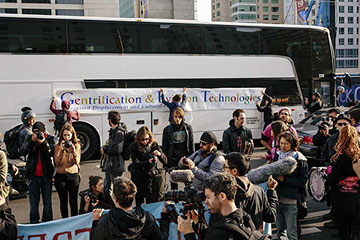
Protesters who blame tech wealth for San Francisco's soaring housing costs blockade a private shuttle filled with Google employees.
Outside a Tony Osteria in the mission District, the oldest settled part of San Francisco, a 29-year-old muralist with the word hopeless tattooed across his knuckles holds a sign: Miserable, Hungry, homeless and completely without any shred of hope. Ronin Tomoshima has been living on the streets for six months and standing on this spot for two hours, panhandling outside a restaurant where a $29 octopus sandwich sold out by 8 p.m.--and was quickly replaced by a $27 swordfish plate. "A bunch of rich people moved into my neighborhood," he says. "I'm not going to let them run me out because they have more money than me."
Class tensions have settled over life in San Francisco like a dreary fog. Teachers, cooks and musicians are packing their bags as high-rises with two-bedroom apartments renting for $6,000 per month open their doors. Residents who have only a high school education are filing out of the city, while college graduates with more earning power are flooding in. African Americans now make up 6% of the population, half of the percentage in 1980. Longtime residents are worried that San Francisco is becoming a homogeneous haven for the rich, a concern facing other major metros across the U.S. "The question for cities like San Francisco and Seattle and Boston is, Can you continue to be a place that is accessible to people across parts of the income distribution?" says Alan Berube, a senior fellow at the Brookings Institution Metropolitan Policy Program. "The pressures of inequality are the here and now for cities."
The friction is particularly acute in San Francisco, where the median household income of $73,000 is almost 50% higher than the U.S. average. A combination of exploding wealth and limited space has led to an affordability crisis. Much of the angst among the have-nots is directed toward the region's booming tech sector, which is attracting well-paid workers who once settled around San Jose and now regard the City by the Bay as the only place to be. San Francisco is choosing the new Tech class over long-term residents, one protest flyer reads. SF for the people, not for Google! reads another. City leaders, meanwhile, are trying to make peace among the deep-rooted residents who made the neighborhoods what they are and the tech companies that are making the economy hum.
High Tech, High Rent
The signs of change are everywhere on Market Street, the grand but blighted artery running through the heart of the city. Graffiti and shuttered storefronts are followed by cafés offering $65 beers aged in Chianti barrels. Billboards promising quick check cashing give way to sleek ads for luxury apartments where residents can summon a valet via touchscreen to fetch their cars. Construction cranes swing through the sky above yet-to-be-built high-rises, as homeless people push their carts on the sidewalks below. Where the thoroughfare hits 10th Street, there flies a familiar blue bird. Twitter relocated to the Mid-Market area in 2012 after receiving a controversial tax break. So this gentrifying neighborhood is where the company was based during its IPO last November, when an estimated 1,600 people, many of them Bay Area residents, became instant millionaires. Since Twitter moved in, its local staff has nearly doubled to 1,500.
